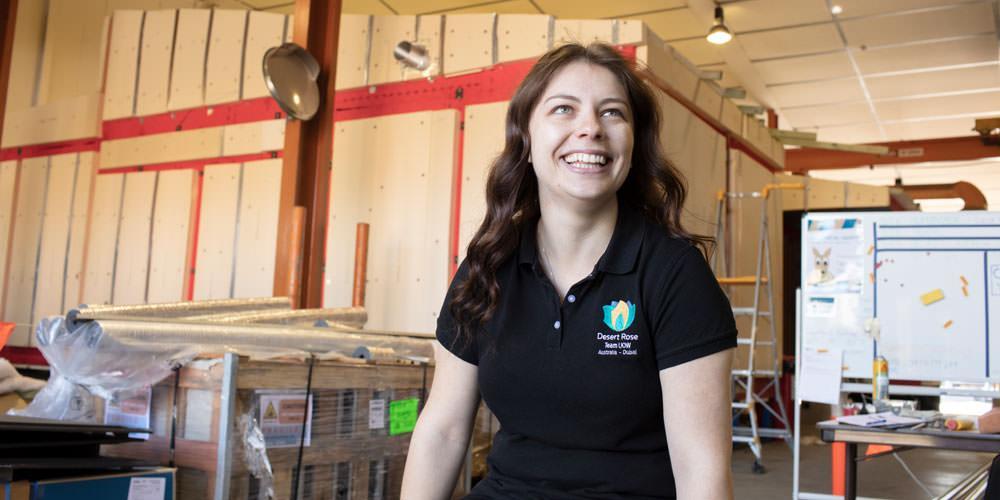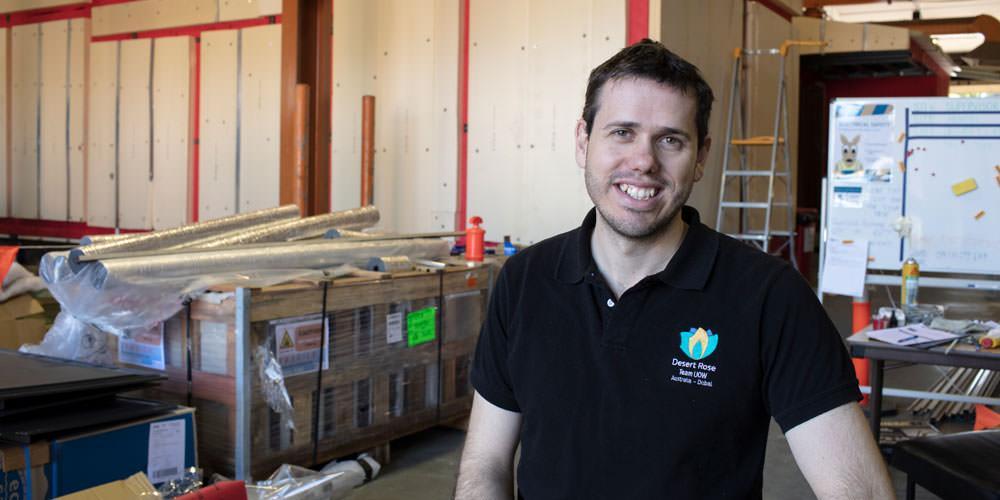Putting heart into homes
A new approach to construction
The PhD candidates were inspired by Team UOW’s Solar Decathlon success in 2013 with the Illawarra Flame House, and are responsible for the Desert Rose House – Australia’s only entry in the 2018 Solar Decathlon, to be held in Dubai later this year.
The international collegiate competition requires the team to design, build and operate a full-size solar-powered house that’s innovative, environmentally-friendly and cost-effective. Importantly – their point of difference – the Desert Rose House also caters for the changing needs of an ageing population.
As Project Manager and Operations Manager respectively, McDowell and Ryan are brimming with motivation and passion to make a difference with this project by demonstrating the impact well-designed homes can have - both in making our world more sustainable and improving the quality of life for our elderly and those living with dementia.
Ryan’s awareness around sustainability came from her undergraduate commerce studies, where she focused on sustainable supply chain management. Her involvement with the Illawarra Flame House allowed her to examine their materials and processes as case studies.
She’s signed up for a second time – the 2018 team’s only double-decathlete – out of enthusiasm for the challenge and the cause.
“The two premises of our house are both really important for our future. We need to protect what we have been given on the planet and we need to find a way to make life as comfortable and enjoyable as possible as we grow older.”

“Besides, I had such an incredible time with the 2013 Solar Decathlon. It’s one of the most exciting things I have done in my life, that I knew if it ever happened again, I had to be there.”
McDowell has always had an interest in sustainable buildings, but it was during his Masters in Engineering Practice that he truly fell in love with the concept. He left his job in the heavy manufacturing industry to undertake a PhD at the Sustainable Buildings Research Centre (SBRC).
During his research, McDowell collaborated with the Energy+Illawarra energy efficiency initiative to visit, audit and retrofit the homes of 200 low-income ageing Illawarra residents. That was when his commitment to sustainability took on the additional resolve to improve the quality of life as we age.
“I came across a suite of instances where elderly occupants’ lives weren’t as good as they could be because of small things within their homes,” he says. “For example, many had hands so badly affected by arthritis, they couldn’t do things like open their windows or turn their taps.”
As these instances continued to grow in number and severity, so did McDowell’s determination to use his industry and project management experience to help create the Desert Rose House.

“I feel like I’m contributing something positive with this project - something not focused on turning a profit, but on changing the world for the better. That’s really important to me,” he says.
“This extra purpose has driven many in our team to pour so much of themselves into the Desert Rose; we’ve created a house that’s full of heart, where every element is inspired by our stories and experiences - like those windows, which are now automated.
“The taps we’ve also made electronic, so there’s no resistance when you turn the handle. They have LED lights that change colour to indicate the temperature of the water delivered and the handles can be change to look like any generation of tapware, so they’re still recognisable to elderly people. We can even program smart functions into them - like when a person living with dementia goes to the toilet, after they flush, the taps automatically turn on to remind them to wash their hands. There’s a lot of potential to help people.
“They’re seemingly simple things, but every bit helps with liveability and can make such a big difference to a person’s life. So with the Desert Rose, every little detail has been considered and carefully selected.
“This is what makes this project special and much more than just a sustainable house.”
While winning the Solar Decathlon is certainly a goal, McDowell and Ryan’s priority is to spark change around how people think and work together to create more sustainable, liveable buildings.
“We hope the Desert Rose House will become a beacon to others that we can improve the quality of life of those living with aged-related disabilities,” McDowell says.
“We want to inspire that dialogue in the construction industry - to get businesses spending more time thinking about the people occupying their homes and how their needs change as they grow older; and at the same time, how these homes can be designed in a way that uses minimal energy to heat and cool and uses environmentally-friendly products that produce a healthy environment to live in.”
“By making connections with industry, piece by piece, conversation by conversation, we can influence people to go beyond tradition and try something new; to think and act differently with the goal of a better future for all of us,” Ryan adds.
“We’re already discussing how we can do this with many industry bodies and they’re now approaching us independently, so this is a huge achievement. It’s making a difference.”
Clayton McDowell
Desert Rose House Project Manager
Bachelor of Mechanical Engineering, 2009
Master of Engineering Practice, 2012
Emily Ryan
Desert Rose House Operations Manager
Bachelor of Commerce (Supply Chain Management), 2014